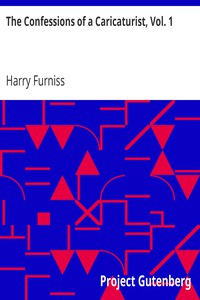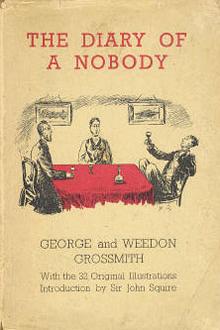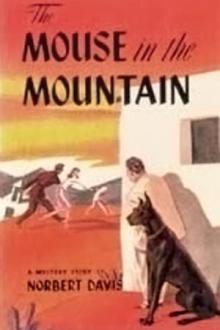The Confessions of a Caricaturist, Vol. 1, Harry Furniss [digital book reader txt] 📗

- Author: Harry Furniss
Book online «The Confessions of a Caricaturist, Vol. 1, Harry Furniss [digital book reader txt] 📗». Author Harry Furniss
"I am not in favour of capital punishment, and would do away with all judges and trials by jury, leaving the Press to fight out the criminal cases between themselves.
"I believe in free education, free libraries, and a free breakfast table, [Pg 206] and would propose that free book-stalls and free restaurants should be compulsory on all railways.
"I am strongly opposed to vivisection, and hold that the life of a rabbit is quite as valuable as that of a professor. At the same time I would not countenance any law making it a punishable offence to boil a lobster alive.
"I am a believer in hypnotism, thought-reading, and theosophy (I have been a bit of an amateur conjurer myself).
"Right of public meeting? Certainly. This should be a free country—everyone do as he likes. Football in Hyde Park, and fairs in Trafalgar Square. Equal freedom for all processions—if Booth can stop the traffic, why not Sanger's menagerie?
"As to local option, by all means let all public-houses be closed. (I never enter one.) And all clubs, too, so long as my own are not interfered with.
"I am not at present a member of any political club, but if you wish me to become one I will put up at the Reform, either as a fervent Gladstonian or a red-hot Unionist; I don't mind which, as neither have the slightest chance of getting in now.
"If, after considering these qualifications, you are of opinion that I would be the right man in the right place, I shall be most happy and willing to become your chairman.—Yours, etc."

regret to have to confess that I once posed as a political prophet. I was encouraged to prophesy the fact that six months before the election of July, 1892, when Mr. Gladstone was confident of "sweeping the country" and coming back with a majority of 170 or so, when both sides predicted a decisive result, and political prophets were cocksure of large figures, I luckily happened to be more successful in my vaticinations than they, giving the Gladstonians a majority of something between forty and forty-five. [Pg 207] The actual majority turned out, six months afterwards, to be forty-two. This encouraged me to write the following letter to the Times, and it appeared July 19th:
"A Parliamentary Prophecy.
"Sir,—I am surprised that no Parliamentary chronicler has written to the papers to thank the electors of the United Kingdom for the happy result of the General Election. The jaded journalist is the only person to whom the result is pleasing, as he will have no lack of material for descriptive matter in the coming Parliament.
"The Gladstonians are not pleased, because they have barely got a working majority. The Conservatives are not pleased, because they have not got one at all. The Liberal Unionists are not pleased, because they go with the Conservatives. The Irish Nationalists are chagrined, because of the success of five Unionists in Ireland. The Parnellites feel mischievous but unhappy. The Labour representatives mischievous and happy—they are the heroes of the hour—and, although the members of the Labour Party have hitherto been nonentities in the House, they will probably be 'named' several times in the future. But Parliament is a refrigerator for red-hot rhetoric, and such Members will, in time, find respectability and aspirants,[2] and grow dull.
"A harassed leader, an ambitious Opposition, the balance of power resting in the hands of the Irish, divided amongst themselves, a new and probably noisy party, boredom increased, faddism intensified—such are the ingredients of the new House; and with little spice thrown in in the shape of a revived morality scandal, the new Parliament promises to be a hotch-potch of surprises. I myself take no side in politics, and am glad to say that I have numerous friends in all parties. Perhaps it was in consequence of this that I heard all sides of opinion, thereby enabling me six months ago to weigh all my information correctly and predict the result of the General Election—a Gladstonian majority of between forty and forty-five votes—and to this opinion I have firmly adhered in spite of the fluctuating prospects before the fight. Even on Wednesday, the 6th inst., when the returns pouring in seemed to point to a Government majority, I stuck to my prophecy.
"I am now receiving from my friends (more especially from my Liberal friends) congratulations upon my perspicacity, and, although I am no Schnadhorst, I must now regard myself in the light of a Parliamentary prophet. Having in that capacity chanted my incantations and calculated the number of square feet of Irish linen in one of Mr. Gladstone's collars to be in inverse ratio to the dimensions of his Mid-Lothian majority, and having by abstruse computations discovered the hitherto unknown quantity of Sir William Harcourt's chins, I can safely predict that there will be [Pg 208] another General Election within the space of thirteen months, and that the result of the same will be the return of the Unionists with a majority of fifteen.
[2] See page 212.
 THE HOUSE OF COMMONS FROM TOBY'S PRIVATE BOX.
THE HOUSE OF COMMONS FROM TOBY'S PRIVATE BOX.
"Yours truly,
"Harry Furniss.
"Garrick Club, London, July 19."
The regret I felt was not caused by any failure of my prediction contained in the last paragraph in that letter, but that the whole of it was taken seriously. Editorial leaders appeared in [Pg 209] the principal papers all over the kingdom. Letters followed, discussions took place, and politicians referred to it in their speeches. "Mr. Harry Furniss has taken the public into his confidence, as one who is thoroughly acquainted with Party politics, though he takes no personal interest in them. Men who can thus truthfully describe themselves are excessively rare, as far as we know. It is usually the person who does not understand politics who takes no interest in them. A man who understands politics, but does not concern himself to take sides, is in the position of the looker-on who sees most of the game," was truthfully written of me � propos of this letter—but why � propos of this letter? Why not of my serious work instead? No, my "airy persiflage" was only a cloak. I was seriously and instantaneously accepted as a serious political prophet, and otherwise criticised:
"To the Editor of the 'Times.'
"Sir, In a letter signed by Mr. Harry Furniss, which appeared in the Times of the 21st inst., the writer concluded by predicting that there would be another general election within thirteen months, and that the result would be a Unionist majority of fifteen.
"Mr. Furniss is evidently fond of odd numbers, but may I point out to him, and to many other political prophets who have fallen into the same trap, that the fulfilment of his prediction is an impossibility?
"In a House of 670 Members, or any other even number, if divided into two parties, the majority (in the sense he uses the word—viz., the difference) must always be an even number. It is true that the division lists sometimes show a majority which is an odd number, but in such a case an odd number of Members must have been absent from the division. Mr. Furniss must prophesy either fourteen or sixteen.
"The English language is so defective that the word 'majority' is used to mean 'the greater number,' and also 'the difference between the greater number and the less.' Cannot a new word be invented to replace 'majority' in one or other of these meanings, and so avoid the use of the same word for two distinct ideas?
"Your obedient servant,
"George R. Gallaher,
"Fellow of the Institute of Bankers.
"44, Fenchurch Street, London, E.C."
[Pg 210]
I suppose F.I.B. stands for "Fellow of the Institute of Bankers." Anyway, before I had time to reply to the courteous captious critic the Times published the following:
"Political Prophecy.
"Sir,—In endeavouring to correct Mr. Furniss your correspondent Mr. Gallaher has forgotten that, although the House of Commons consists of an even number of Members, one of those Members will be elected Speaker; and that consequently, if all the Members were on any occasion to attend, the majority would be an odd, and not an even number. There is therefore no necessity for Mr. Furniss to alter his prophecy at present.
"Your obedient servant,
"Fair Play."
Other correspondents, less technical but strongly political, accused me of being "an inspired Conservative spy." Others that I was an oracle worth "rigging." And the Irish and Radical Press questioning my impartiality, I published this letter:
"To the Editor of the 'Manchester City News.'
"Sir,—My attention has been called to a paragraph in your issue of July 23rd, stating that I am a Conservative, an assertion which has highly amused those who know me well, for I am one of the strongest of Radicals in some things and the hottest of Tories in others. I earnestly advocate the claims of the working man, and sometimes I feel myself a Whig of the old school. Whether I am a Tory, a Liberal or a Radical, troubles me very little, but as you seem to take a kind interest in my political opinions I should have preferred you to have styled me an Independent, which I understand means nothing.
"Harry Furniss.
"Garrick Club, London."
But neither "Independent" nor humorous would the partisan Press allow me to be. Certainly I was applauded by some for having held steadfastly to my prophecy, despite temptations which would have made Cassandra succumb. I was flattered by being held up as an exception among the prophets. From Mr. Gladstone to Mr. T. P. O'Connor politicians had prophesied and were hopelessly wide of the mark. Mr. Chamberlain, speaking at Birmingham that week, said, "The gravity of the weighty man of the House of Commons, gentlemen, is a thing to which there is no parallel in the world," and oh! so serious!
[Pg 211]
 THE GOVERNMENT—BENCH BEFORE HOME RULE
THE GOVERNMENT—BENCH BEFORE HOME RULEA rough Sketch made in the House.
"Prophets—at any rate political prophets—are chiefly distinguished from other people by being always dull and nearly always wrong. To-day, however, appears a brilliant exception to the almost universal rule," wrote one paper, and yet continued, "Mr. Furniss is simply within his own ground as one of the shrewdest and best trained of living observers, when he describes the newly-elected House of Commons as thoroughly discontented with itself. But we wish that Mr. Furniss had carried his prediction into the regions of counsel, and had been able to read in 'Mr. Gladstone's collars,' or in the 'unknown quantity of Sir William Harcourt's chins,' and whatever else serves him for his Stars, what is to be the outcome of a situation in which no party is able to obtain a working majority. If Mr. Furniss is right, the question of 'how is the Queen's Government to be carried on?' will assume a practical importance which it never had before; and unless he himself, as a thoroughly non-party man, can be induced to undertake the formation of an administration of similarly fortunate persons, one does not see what is [Pg 212] to be done. Party government is based upon big majorities—it is within measurable distance of breaking down altogether unless the country will make up its mind to stand no more nonsense, and to prefer what is really a party to a conglomerate of fads and factions."
I was beginning to feel like a man who had started a story and forgotten the point of it. The only "comic relief" was the following note from the Editor of Punch:
21st July, 1892.
Vates et Vox Stellarum.
"Dear H. F.,—'Respectability and aspirants.' Didn't you squirm at the misprint? Is that setter-up-of-type still alive? Je m'en doute. The reference to Harcourt's chins will get you liked very much.





Comments (0)